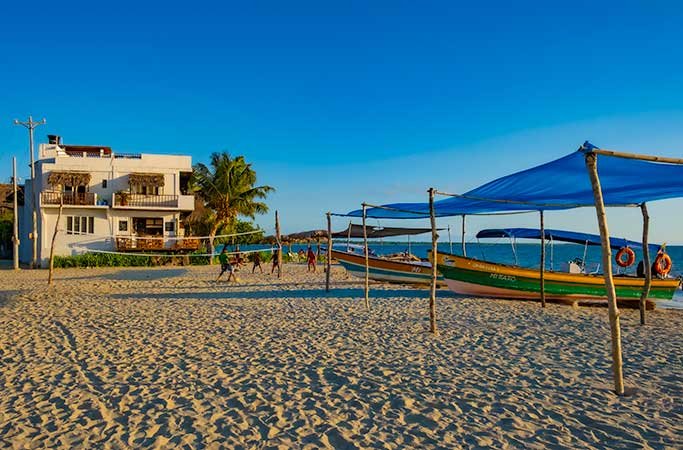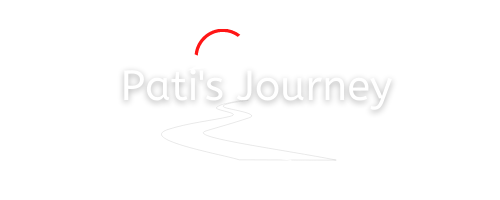Pati’s Weekly Bite 16 – Life in Colombian Paradise
A boy working at the beach bar on Playa Blanca Colombia asked me how long his monthly wage would last him in Poland. He earns an equivalent to around €70.
In the majority of European countries, this money wouldn’t last him for very long. We know that.
As I walked away after I had my coffee at his shop, I realised what was his question really about.
We spoke about my travels, so he tried to find out whether he would have been able to travel if he had saved his entire wages. And I felt very sad when I realised that he would have to be saving for a very long time.
So far, I have seen more of Colombia than some Colombian folks I have met during my journey. They ask me about Palomino, or how is Santa Marta or if one day in Tayrona Park is enough.
I started my journey on the Caribbean coast of Colombia. I wanted to see it all with few particular articles in mind, but also, I just wanted to live the true beach life. My soul needed it.
Up the coast of Colombia, life is very simple. There are many issues this country is facing, and they seem to be more prominent the further along the coast you travel.
Apart from the very low wage people have to live on, there are two main issues around the Colombian coast – water shortage and waste disposal. And those are not just some issues – those are severe and pressing problems.

Baru Island near Cartagena is a Colombian paradise on earth.
Once a month a giant boat loaded with water departs from Cartagena to Barú. Upon arrival, it empties the water into a huge pool that distributes it to two pools, where the Baruleros buy it in tanks. With 20-litre white and yellow plastic tanks (equivalent to 5 gallons), residents come to the pools to stock up on water on a daily basis. Everyone has these tanks in their homes. Once full, they are transported to their residences in wheelbarrows through the unpaved streets of the town. This is how the water service works in one of the most touristic islands in Colombia.
In some hostels, you can shower only once and for no more than 5 minutes. If you want to shower more often or for longer, you have to pay. The water is scarce.
32% of the Caribbean region of Colombia suffers from water shortage.
Although water supply via aqueducts greatly improved in the last two decades, there are still regions like La Guajira where water shortage and rationing are people’s everyday reality.
I haven’t seen two coloured taps (hot and cold) for ages. There is one tap, you open it, and this is it – water flows. Sometimes lukewarm as it’s been heated by the sun, sometimes cold like in Minca, for example. That was very cold! You should be happy there is water for a shower. As you will travel to the Guajira region, a long shower is a luxury.
The drinking water is sold in shops in the form of plastic bottles of plastic bags, with the latter being ith the commonly used. Apart from Santa Marta and Cartagena, I have not seen a garbage track collecting rubbish even once. I have seen the most incredible beaches along the Guajira coast with plastic lying around in unimaginable amounts. Plastic bottles lying around the beaches don’t bother anyone.
But, during my La Guajira trip, I saw kids to whom we gave plastic bags of water, and their faces beamed! Things we take for granted are like gold for them. And as they live in the desert, we can imagine what happens with those plastic bags.
There are many pueblos spread along the main road leading from Santa Marta all the way to Riohacha. I love observing their life. It’s simple, and people don’t seem unhappy.
There is music everywhere. You can buy cheap empanadas, arepas cos huevo and roast chicken at every corner. Small local shops sell everything you might need – fruit and veg (all organic, by the way), coffee, rice, bread, snacks, beer and rum.
Kids are playing barefoot on the street. Girls playing games I used to play when I was their age and kids these days don’t even know about. Men and women are lying in hammocks on a hot afternoon, women sweeping their front porch with doors wide open, and you can easily see inside of their houses.
Everyone rides a motorbike. There will be just a few that worry about a helmet or any kind of safety issues. I have seen a man on a bike with a woman at the back feeding her baby. I have seen three people on one bike holding five bags etc.
The small town busses have their doors and windows open, so the air can get in (excellent airconditioning) and no one complains about health and safety.
There are potholes in the pavement, and if you trip over, it’s your fault because you didn’t use your eyes properly.

It slightly resembles my life when I was little. I played all day outside, in the mud, with no cell phone and far from my mom’s and grandparents sight. When it was time for lunch or dinner, parents would call from the windows. There was no text messages or WhatsApp.
We used our imagination when playing games, there was nothing to watch on TV, and there were no computer games nor mobile phones.
If someone spilt the water on the floor, you would just walk around it; if there was a pothole, you would walk around it, you wouldn’t sue the local administration if you tripped over.
We didn’t have much. We lived in a communist country. Colombians don’t have much. They live in a country where government leaves them to their own devices, and they are forced to make a living by all means available.
This makes me ask the question – do we need to live in a country with an oppressive, corrupt or negligent government to truly appreciate the beauty of simple things? Do we need to be stripped of luxury, fancy shops and complaint policies to smile every day and care for each other?
Because everyone cares for each other here. Truly.
Do we have too much?
Do we become greedy and relentless once we have been given too much freedom? Or have we lost the purpose in life given too many things in life became easily available.
During my stay on Playa Blanca, I would lay on the beach and observe young folks taking posed selfies and photos on the beach. I am sure a tone of filters has been applied to them. Then I looked at the ladies trying to sell their handmade jewellery and massage to the same selfie people.
You would think that those turist girls were happier as they could effort the trip and their flashy cell phone and outfits that don’t belong on the beach but belong on the Insta. I am not sure, though.
So that boy from the beach bar wanted to travel. I could see the longing in his eyes. But then I don’t worry, because if you really want something, everything is possible.
I also met a guy yesterday who told me he went to Medellin for a little while to work. And then he decided to come back to Rincon. Because Rincon is a paradise.
We all have dreams and longings. It’s what makes us. Maybe when we have it all, we forget who we really are.
Yesterday I arrived in Rincon del Mar. I am completely besotted by this place, and I will most likely extend my stay here.
I woke up this morning and ventured into the ‘town’ in search of coffee and breakfast. I went for a swim straight after as the sun after midday is lethal. As I sat on the beach and read my book, I realised that I’m happy.
But this was a different type of happiness. The kind of happiness I have not felt probably since I was a child. I felt peaceful inside. I didn’t need anything. I didn’t need more clothes, I didn’t need more food, and I even didn’t need people. I didn’t need anyone or anything to validate my worth. I felt utterly at peace with my surroundings. I, the sky and the sea were one.

Rincon del Mar is a place still not invaded by hoards of tourists and street sellers, and life couldn’t get simpler than that. I see people’s lives being the same every day.
They look into their chores or daily jobs. They do whatever they can. They run small hostels and restaurants, take people on boat trips to swim with fluorescent plankton, or see the nearby island. They fish in the morning and fix their boats and fishing nets in the evening. They play ball on the beach, talk to each other and chill in hammocks. Have a little party on the weekends. And this is it. The days go by.
I’ve been chasing life for such a long time that it took me a really long time to be able to put a brake on it truly. And today, for the first time, I felt I actually felt it. There is nothing to chase. Life is now. Tomorrow eventually becomes today.
I will move on, but for now, I’m enjoying the today. For as long as I can.

